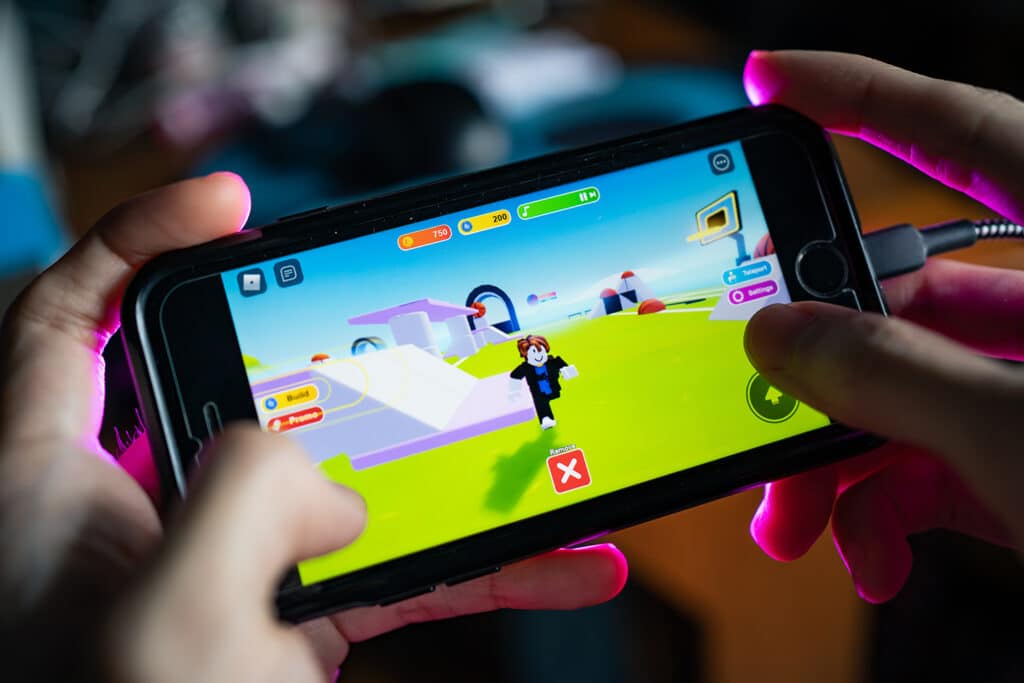Robloxian. Robux. Reeeee. Noob. Obby.
Confused yet? You’re not alone. These are terms and video game slang from Roblox: one of the most popular mobile apps and entertainment platforms worldwide.
Of its 200 million users, 67% are under the age of 16.1 So, while you may have never heard of it, your kid has, and chances are good that they’ve played it.
Roblox’s New Parental Controls
Roblox recently expanded its parental controls on accounts for children under 13. Parents can now set a screen time limit, view their child’s friends list, change chat settings, adjust content maturity settings, and set a spending limit.
While any increase in parental controls is a win, many question if its enough to shield children and teens from the dangers of Roblox, including predators and inappropriate content.
The unique appeal of Roblox is that it isn’t just a game. Roblox describes itself as a “global platform where millions of people gather together every day to imagine, create, and share experiences with each other in immersive, user-generated 3D worlds.”2

This means any kid or adult can use Roblox Studio within the platform to create their own digital experiences then invite other users to join them to play and hang out together, digitally. Anyone with a smartphone, tablet, computer, Xbox One, Oculus Rift, or HTC Vive can download Roblox for free (Roblox makes money through in-app purchases and ads).
It’s a pretty remarkable and revolutionary concept. But because so much of the content is created by users, it unfortunately does come with significant risks.
Is Roblox Dangerous for Kids?
Similar to YouTube, the user-generated nature of Roblox (along with its social features) means inappropriate content and interactions are a very real possibility. The platform does offer parental controls (more on that below) but in a worldwide, content-generating, community numbering millions of users it’s impossible to guarantee kids won’t be exposed to inappropriate content or dangerous communication.
While not typically categorized as social media, Roblox’ interactivity and digital connection allows the platform to function a lot like other social networks.
That means online safety threats like scams, cyberbullying, and online predation are all possibilities within Roblox. That is especially concerning given how young the majority of Roblox users are.
Another major concern stems from the fact that as an entertainment platform Roblox does its job really well: The average daily user on Roblox spends 2.6 hours each day on the platform.3 Many parents already worry about screen time and adding Roblox into the mix is likely to exacerbate that concern.

Roblox is a pretty good sample for the larger challenge facing parents in the 21st century. We have amazing technology at our fingertips and much of it can be great for kids. But the same innovations that open the world to our children can also harm them.
If you feel like Roblox might be too dangerous for your kid then the safest route is to keep him or her off it in the first place. Kid-safe tech like our Gabb Watch, Gabb Phone, or Gabb Phone Plus can make that easier by giving them all the digital tech they need now, without exposing them to the dangers.
If you do feel your child is ready for a platform like Roblox then you’ll definitely want to use the platform’s built-in parental controls. Many parents wonder if the parental controls really do the job to keep their kids safe. The short answer: They’re better than nothing, but they also won’t guarantee your child is shielded from the risks mentioned above.
Below we’ve provided a quick explanation of Roblox’ parental controls so you can get a better idea of how they work, how to use them, and how to prepare your kid for the possibility that they might still face some digital dangers while in Roblox.
How to Use Roblox’ Parental Controls
Roblox’ account settings are based on player age. When a user sets up an account, they are required to input their date of birth (although no date-of-birth verification is required). Roblox’ default protection settings prevent the sharing of personal information for all ages, filter posts and chats for inappropriate content for all users 12 years and younger, and allow any user to report abuse.
Additional protection through parental controls can be applied to any account (regardless of user age). With parental controls, you can disable various chat features on your child’s account, which includes limiting who can chat with them, follow them into games, and invite them to VIP servers.
Setting up an Account PIN
Roblox accounts allow users to set up a 4-digit PIN that is then required to access and enable account restrictions. We recommend parents set this PIN for any child who is new to digital communication and needs maximum protection. For more mature children, you might consider disabling the PIN and having a discussion with your child about how to stay safe on Roblox.
How To Set up the Controls
- Log in to the Roblox account
- Click on Settings (gear icon)
- Click Parental Controls
Within Parental Controls you’ll be able to adjust the protective settings. This includes: restricting chat and messaging to certain users (or disabling it altogether), preventing access to all but a list of age-appropriate games, and limiting how much money your child can spend on Roblox’s in-game currency (or disabling purchases entirely).
While logged in to the account, parents should also be aware of how to view what their child is doing within Roblox. Within the account, you can view private message history, your child’s list of friends and followers, their list of creations, and any virtual items they’ve purchased. We suggest communicating clearly with your child about if, or when, you will be checking in on their account so as to maintain a healthy, trusting relationship.
Keeping Kids Safe Online
Whether it’s specific to Roblox, or to other online platforms, talk with your child regularly about staying safe online. Few things will bring you more peace of mind than being confident your child knows your expectations and understands they are for their own protection, and not due to a lack of trust. Sooner or later, your child is likely to spend significant time online so teaching them how to do that safely is now an essential part of parenting.










Success!
Your comment has been submitted for review! We will notify you when it has been approved and posted!
Thank you!